|
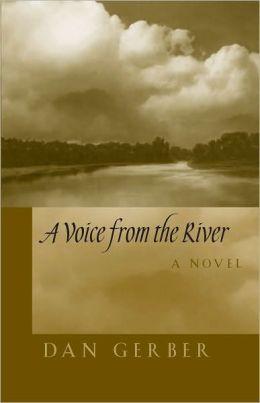
A
Voice from the River by Dan
Gerber
Book Review
by Tim Bazzett
Livingston,
MT: Clark City Press, 1990 ($12.95, 196 pages)
I have been
aware of Dan Gerber's work for forty years or more, mainly because of his early
collaboration with Jim Harrison in publishing the Sumac literary magazine and
also some books under the Sumac Press imprint. This was back in the late
sixties and early seventies, before Harrison broke big with his LEGENDS OF THE
FALL and went on to become a prominent figure in American letters for both his
fiction and his poetry. Gerber's work, on the other hand, has gone largely
unnoticed by American readers. This is partly, I suppose, because his output
has been sparse and uneven in quality. I remember reading, back in the
seventies, an early Gerber novel, OUT OF CONTROL, about auto racing, which was
not particularly good, and I hadn't read any of his work since. There hasn't
really been much, most of it thin volumes of poetry.
But now here's this novel, A VOICE FROM THE RIVER - new to me, but it's
actually been around since 1990, first published by Clark City Press, out of
Livingston, Montana. It was reprinted in 2005 by Michigan State University
Press, the alma mater of both Gerber and Harrison, as well as Tom McGuane, the
third member of what was once considered a triumvirate of promising young
literary lions out of East Lansing. McGuane, like Harrison, has gone on to
considerable success as an author.
Gerber, however, has continued to languish in the ranks of middle tier writers.
Poetry has always been a hard sell in America, and Gerber has published only
four books of fiction in a stop-and-start writing career that now spans nearly
fifty years. During most of that time he also served on the board of directors
of the Gerber foods empire, which probably ate up a lot of his time and may
also have been a kind of soul-sucking experience for a man who has aspirations
to a writer's life.
Here's the thing, though. When he wrote A VOICE FROM THE RIVER, he was
obviously drawing heavily on his own experiences as the unwilling scion of a
successful business. At the same time, there is enough invention involved to
make this a beautifully wrought work of fiction.
Protagonist
Russell Wheeler is a WWII veteran who returned to his small Michigan town to
head up a paper business inherited from his father. Russell's son Nick is a
disaffected veteran of Vietnam, uninterested in the family business who wants
to run an art gallery. Russell is haunted by three years spent living with a
tribe of stone-age cannibals who rescued him and nursed him back to health
after his plane was shot down over the mountainous jungles of New Guinea.
Nick has his
own demons after serving a tour as a transportation and graves registration
officer responsible for the disposition of dead and wounded. He finally simply
walks out of his job with the family business, leaving his wife and daughter
behind, and moves to New York, where he begins a new life with another woman
and plans to open an antique store. Russell, whose wife had left him years
before, becomes romantically entangled with his son's abandoned wife, Lesley.
When this part of the book emerged, I was immediately reminded of one of
Updike's RABBIT books; I think it was the last one, RABBIT AT REST, in which
Harry has a brief affair with his son Nelson's wife. But there's a difference.
While Updike's Rabbit was always something of a rascal, running on animal
instinct, Gerber's Russell is a romantic, who finds himself deeply in love with
Lesley, wrong as he feels it might be. There is an empathetic elegance in
evidence here, a tenderness, which wasn't there in the Updike story. What
perhaps makes the two stories seem more alike, however, is the fact that both
men are very conscious of the effects of aging and the inescapable fact of
death.
In a passage which gives the book its name, Russell remembers his aborigine
rescuer and friend, Kopa Ki, proudly calling out into the river gorge and
hearing his echo, saying: "It is the voice of my spirit from the river ...
It tells me that I am still with the living ... That I have not yet been taken
by my ancestors."
Both Russell and Nick feel that same sense of time passing, of urgency to do
something important with whatever remains of their lives. And in their own
ways, they both break away from the ties of family and business. And therein
lies a beautiful tale of love, loss and redemption. Gerber definitely got his
stuff together for this, his most "recent" novel. Some of the
elements he has lived, and some are artfully invented, but this is simply one
hell of a riveting story. The ending seems right, perhaps even perfect. A VOICE
FROM THE RIVER, is a beautiful book. Very highly recommended.
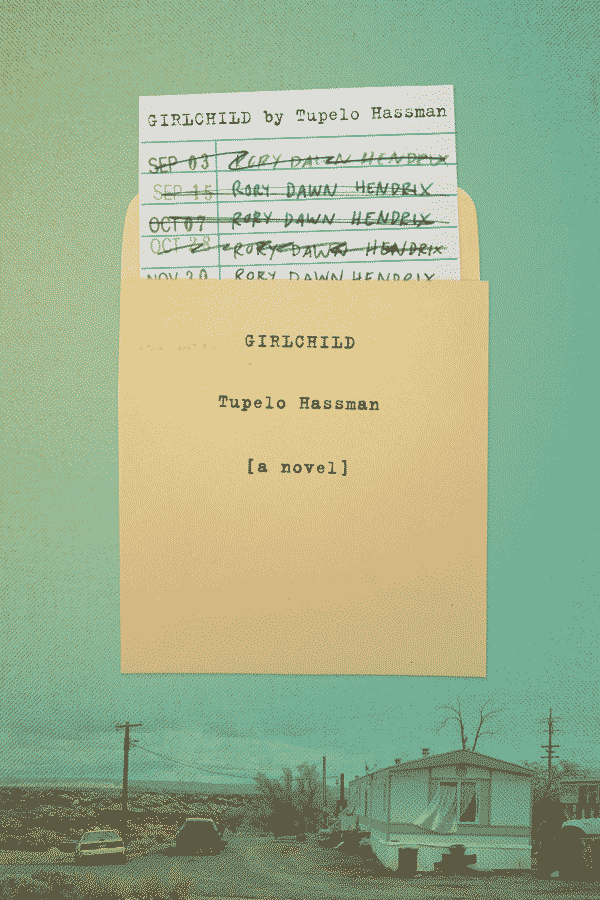
Girlchild
by Tupelo Hassman
Book
Review by Tim Bazzett
New York:
Farrar, Straus and Giroux, 2012 ($24, 288 pages)
Tupelo
Hassman's debut novel, GIRLCHILD, quite simply: Blew. Me. Away.
Rory Dawn, or R.D., Hendrix and her hard-luck bartender mom, Johanna, live on
the Calle, short for Calle de las Flores, a dead-end trailer park on the
fringes of Reno. The fact is the only flowers Rory can depend on are the
toilet-paper flowers fashioned for her by one of the regulars at the Truck
Stop, the bar where her mother works. The Calle instead brought to mind another
street I read of many years ago, STREET WITHOUT JOY, the title of Bernard
Fall's landmark history of the Vietnam conflict. Indeed, Hassman's young
heroine-narrator describes her street thusly:
"And the Calle is a kind of war zone, the enemy is all around us, the
enemy is us. We're so pent up we can't even trust ourselves, let alone each
other ... there's wounded everywhere, and that's what the bars are for, to
house the wounded. Tending bar is a triage all its own."
So yeah; there are no real flowers on the Calle, only misery, sexual predators,
dashed dreams and ruined lives. R.D.'s own misery is meticulously recorded in
short bursts of powerful prose, although some events so painful they can only
be described in long lines of blacked-out words, leaving the physical and
emotional carnage to the imagination of the reader. But there is hope for Rory.
She reads. And sometimes there is salvation in books - a way out. A superior
student in a mediocre school system, she stands out, even while she endures
unspeakable horrors in her home life.
Fatherless and victimized by sexual predators, she takes comfort in TV shows
like "Family Ties" ("because the dad's beard is soft like his
voice and the mom's teeth are crooked and she smiles sweet anyway...") and
"M*A*S*H" ("because of Hawkeye ... Hawkeye doesn't quit. Even
when he's up to his elbows in blood and bombs are falling, and the lights won't
stay on, he doesn't walk away. Hawkeye will save your life no matter where you
come from ..."). Again, you will note that R.D. may be just a kid, but she
can obviously relate to war.
Her other refuge on this street without joy is her grandmother, who does manage
to coax some flowers from the arid desert soil. And although both Grandma and
Mom are fallible - imperfect and beaten down by lives wracked with sexual
abuse, poverty and hopelessness - Rory clings desperately to their love, even
to the point of shielding them from what is happening to her, afraid they'll be
disappointed.
She also has her own personal bible, a dog-eared copy of THE GIRL SCOUT
HANDBOOK, which, unfortunately offers no chapter with advice on becoming a
woman, so she writes her own chapter: "Proficiency Badge: Puberty,"
which is guaranteed to bring a rueful mix of tears and laughter.
It's been a while since I last read such a powerful coming-of-age novel. One I
can think of is Alicia Erian's TOWELHEAD. But nah; Hassman's Rory Dawn Hendrix
is one-of-a-kind. I could say so much more about this book, but I don't want to
spoil it. I will give it my by-now trademark highest praise: "HOLY CRAP
THIS IS A GOOD BOOK!" VERY highly recommended.

The Watch by Joydeep Roy-Bhattacharya
Book Review by Tim Bazzett
Hardcover:
304 pages
Publisher:
Hogarth, 2012
Price:
$25.00
ISBN-10:
0307955893
ISBN-13:
978-0307955890
How to
describe a book like THE WATCH? The publishers say it's a modern retelling of
Sophocles' ANTIGONE, which is one hell of a hat trick to pull off (and author
Roy-Bhattacharya succeeds admirably in this), but it is so much more than that.
It is, perhaps more than anything else, an indictment of war itself, as well as
a deeply felt homage to the men who fight our wars.
Using
several narrators in the course of the story, Roy-Bhattacharya deftly manages
to convey the horror, the suffering, and the ultimate futility and waste of
war. The central Afghan character is a woman grieviously wounded by the war who
has lost her whole family to an American drone attack directed by faulty
intelligence. Nizam, like Antigone, wants only to bury her dead brother Yusuf,
known also as "Prince of the Mountains." Yusuf had led an attack on
the isolated American garrison in a futile attempt to avenge his family. The
crippled Nizam is single-minded and unmoving in her quest, explaining to the
Americans "the duty that I must perform" -
"I will
dig the grave and place him in it, with his body facing the Quibla. Then I will
say a prayer, pour three handfuls of soil over him, and recite: 'We created you
from it, and return you into it, and from it we will raise you a second
time.'..."
Reading
of
this intended ritual, I could not help but notice the similarities to the
Christian ritual of Ash Wednesday, with its prayer, "Remember man that
thou art dust and unto dust thou shalt return." Another recent book about
American misadventures in the Mideast also came to mind, Benjamin Busch's fine
memoir, DUST TO DUST. Although Busch served with Marines in Iraq, his book
could easily be read as an appropriate companion piece to THE WATCH. In fact,
like Roy-Bhattacharya's fictional Lt Nick Frobenius, Busch was a Vassar
graduate.
There are
so
many stories within this novel that it approaches the status of epic. There is
the career soldier in First Sergeant Marcus Whalen, a blues devotee raised by
an aunt in Baton Rouge. And the medic, Sgt Taylor, responsible for the health
of the whole garrison and charged with the safekeeping of the body of the slain
Yusuf. There is 2Lt Garrison, a by-the-book officer who undergoes a
transformation as he watches the vigil of the wounded girl outside the gates of
the fort. There is the secretly gay company sniper, Simonis, an instrument of
death, who ascribes to the "don't tell" rule, even as he is enticed
the sexually ambiguous Afghan interpreter, Masood (who is presented in the
narrative as the Greek character Ismene).
Captain
Connoly, the garrison commander, could perhaps be seen as Creon, trying to
follow the military and political rules of engagement, cynically suspicious of
the motives of Nizam/Antigone. But he too undergoes a gradual change, so
perhaps the Creon figure here is represented by something else, something more
shadowy and evil, as expressed by Lt Frobenius, a student of the Classics -
"Creons,
man, he says. We're run by a bunch of (expletive) Creons. His face twists with
loathing ... [Creon] was a tyrant and a dictator, but he had nothing on these
clowns. They're all suit and no soul. I tell you, man, the military is the only
institution left in America with any conception of honor ... Think courage,
endurance, integrity, judgment, justice, loyalty, discipline, knowledge. The
rest of them - the civilian leadership, especially - are just a pile of crap.
They've absolutely no vision. The politicians are shameless: all they care
about is power. And the big businessmen and bankers look after their own
..."
The rant
continues, but you get the idea. And Frobenius is not the only one with ideals.
Even the Tajik interpreter, Masood, whose whole family was wiped out by the
Taliban, has his vision, telling Simonis -
"I
would like to tell all Americans - and I'm starting with you - that we need you
to remain here until there is peace in our lands. Don't abandon us prematurely.
You hold the responsibility for an entire people in your hands ... and the only
mistake you've made so far is your support for our present government, which is
completely self-serving and corrupt."
With its
distinctly drawn characters, both American and Afghan, officers and enlisted,
THE WATCH presents an even-handed and microcosmic picture of the mess that is
the American occupation of Afghanistan. The author manages to cover a wide
spectrum of the devastation caused - from the annihilation of whole families
and tribes on the Afghan side to the destroyed dreams, marriages, and lives of
the soldiers serving far from family and home. Roy-Bhattacharya has done his
homework and it shows, in writing which ranges from the sublime, in the
dreamlike sequences scattered throughout the novel, to the profane, in the
obscenity-laced language of the soldiers, with addled conversations which
combine references to Ozymandias and Ozzy Osbourne and bands with names like
Gethsemane and Dream Paranoia. The author is obviously even conversant in the
near-insane language of contemporary music and chooses the names he uses with
care, names that resonate and blend well in his story.
THE WATCH
is
such an artistically complex accomplishment that I have barely skimmed its
surface here. It is a book that should be read by politicians, but I don't hold
out much hope that it will be. It will leave its readers with much to think
about. I thought of other books I've read, which are somewhat similar. I've
already mentioned Benjamin Busch's memoir. But there is also Helen Bendict's
fine novel, SAND QUEEN, about the plight of women in these misbegotten wars,
both the civilian victims and the military women in our own armed forces. Or Britisher
Patrick Hennessey's memoir of his military service in both Iraq and
Afghanistan, THE JUNIOR OFFICERS' READING CLUB. Or from the Vietnam era, Sigrid
Nunez's fine novel, FOR ROUENNA. There are connections galore, I'm sure. But
THE WATCH may well indeed stand alone, as its publishers hope, as a singularly
significant novel of the war in Afghanistan. I for one will not soon forget it.
I recommend it highly.
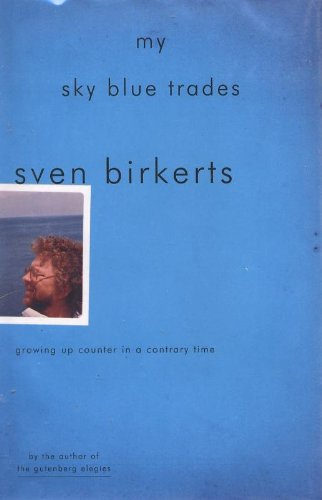
My
Sky Blue Trades: Growing Up
Counter in a Contrary Time by Sven Birkerts Book
Review by Tim Bazzett New
York: Viking, 2002 ($24.95,
280 pages)
I can't even
remember now how I came to find Sven Birkerts, but I think it was by way of a
book jacket blurb he provided for some other writer. That's the kind of reader
I am. I read the blurbs, the acknowledgements, all that stuff on the copyright
page, etc.
Birkerts, like me, is obviously a book-person. His whole life is a testament to
that. He decided early on, around age 14, that he wanted to write, but it took
him another dozen or more years to finally find his niche as a writer. After
struggling throughout high school and college at writing poetry and fiction -
and coming up empty - he finally began to write about what he knew: other
people's books. And since then, over the past few decades, he has become
recognized as a preeminent literary critic and essayist. But even at that, hey,
I'd never heard of the guy.
But in MY SKY BLUE TRADES he tells of his own life. It's certainly not a
rags-to-riches sort of story, since he grew up in Bloomfield Hills (a wealthy
Detroit suburb), son of Gunnar Birkerts, a successful and respected architect.
What makes his life story unique and interesting is that his parents were both
emigrants from Latvia, so he grew up bilingual and always feeling just a bit
'different.' There were generational-cultural clashes between Birkerts and his
father, an ultra-practical and orderly man. His memories of his grandparents
play a big role in his development too. He attended the private and exclusive
Cranbrook School, and then went on to UM in Ann Arbor. But although Birkerts
comes from an upper class background, his coming of age has an element of
commonality. The music of the sixties, the constant trying to fit in, a few
best friends, experimenting with drugs and drinking, crushes, etc. It's all in
there. And then his strivings and disappointments at college, love affairs that
didn't quite work out. But it was what he had to say about books and writers
and his jobs at various bookstores in Ann Arbor and Boston (after college) that
gave his story a kind of "special-ness" for book nerds like me. I was
reminded of a favorite memoir from another equally famous critic and columnist
- Michael Dirda's AN OPEN BOOK.
I must confess I didn't dog-ear a single page in this book, because every page
was special. It was a story I wanted to go on and on. I'm not Latvian. My
parents weren't immigrants. I didn't come from a wealthy family. So what was it
about this book? BOOKS! That's what it was. There's such a rich love of books
and writing displayed here. Well, Sven, me too. Thanks so much for sharing it
all, for writing it all down. I loved it!
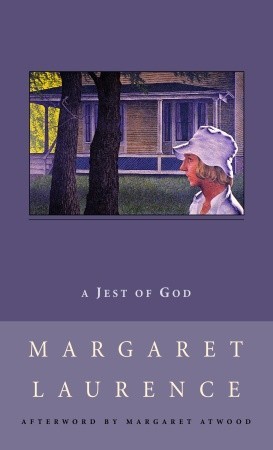
A
Jest of God by Margaret
Laurence
Book
Review by Tim Bazzett
Toronto:
McClelland & Stewart, Inc./New Canadian Library, 1988 reprint ($6.95, 215
pages)
This is not the first time I've
read Canadian writer Margaret
Laurence's fine novel, A JEST OF GOD. But it's probably been at least twenty
years since I last read it and it has lost nothing in the interim. Laurence's
probing of the single life and the kind of "quiet desperation"
Thoreau once wrote about will make you stop and reconsider those people you
know who live alone, or with aging parents. School teacher Rachel Cameron is a
character you don't forget, and may want to revisit from time to time, as I
have. Because her secret, inner life - as demonstrated in her interior
monologues and fantasies - are as important, if not more so, than her actual
life, which seems pretty bleak. Thirty-four, Rachel lives with her
hypochondriac whiny mother upstairs over the funeral parlor once operated by
her late father, teaches second grade in a school presided over by a principal
who is a secret sadist, and has a brief loveless affair one summer with a former
resident of the town who is there to see his parents. The story is told in the
first person and the reader is privy to Rachel's most private and intimate
thoughts, and THIS is what makes this ordinary tale of loneliness and
desperation so very EXTRAordinary.
As I was reading Laurence's book, a minor Canadian classic, I was reminded of
another more recent novel, also by a Canadian, Elizabeth Hay's ALONE IN THE
CLASSROOM, which I enjoyed equally. And I wondered if Hay would count Laurence
as an important influence in her own development as a writer. I must try to
remember to ask her.
I should probably confess that I might never have read A JEST OF GOD had I not
first seen the scrupulously faithful film adaptation, RACHEL, RACHEL starring
Joanne Woodward and directed by Paul Newman. It was - and still is - a small
and perfect gem of film-making. I highly recommend both the book and the film
adaptation.
P.S. Here is
what Elizabeth Hay had to say in her response about Margaret Laurence –
“I
read and loved Margaret
Laurence in my late teens, early twenties. So I'm talking late sixties, early
seventies. She made a huge, huge impression, not just on me but on my mother.
We were reading her at the same time. She was the first Canadian writer I read
who wrote about my life, my country, my mentality, if you like. The
Scottish-Canadian soul. I reread The Stone Angel in the early
nineties, full of renewed admiration. Then I read some things more recently --
her letters to the poet Al Purdy, a biography, and The Prophet's Camel Bell, which
I really enjoyed. The Stone
Angel is considered her best, I think.”
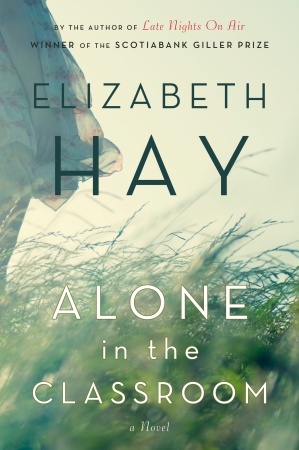
Alone
in the Classroom by
Elizabeth Hay
Book
Review by Tim Bazzett
Toronto:
McClelland & Stewart, 2011 (CDN$29.99, 320 pages)
It's not all
that often anymore that I want, more than anything else, to start a review with
"I LOVED this book!" or my other stock response, "Holy CRAP,
this man/woman can write!" Well, consider both responses rendered for
Elizabeth Hay's ALONE IN THE CLASSROOM. Because this is simply an outstandingly
beautiful and profoundly satisfying book.
A multi-generational story spanning most of the twentieth century, Hay's story
of the Flood and Soper families contains none of the tedium or stock
sensationalism that often characterizes so many of the so-called 'sweeping family
sagas' that I usually run screaming from, but women seem to love - think
Danielle Steele or Belva Plain, for example. Nope. Hay's people are real,
believable, utterly human. The narrator is Anne Flood, but the heroine, at
least for the first half or more of the book is her aunt, Connie Flood, a
strong and independent character who Anne has admired her whole life. And there
is a 'villain' in Ian 'Parley' Burns, who is certainly evil, but also tortured,
thwarted and pathetic. There are strong admirable male characters too, in Sid
Goodwin and Michael Graves. But they too have their all-too-human flaws, as
does the narrator Anne.
The story turns on a couple of violent crimes, separated by many years, and
Parley Burns figures into both. Both Connie and Anne are intricately caught up
in the histories of Burns and, later, the attractive and artistically talented
dyslexic, Michael Graves. Connie, a schoolteacher turned journalist, and Anne,
a schoolteacher and writer, form a strange triangle with Michael, a plot which
forms the heart of the novel. But this is also a story about personal histories
and confusing and tragic family relationships, particularly the ones between
mothers and daughters. Here's a sample -
"Connie indulged Michael the way mothers indulge their sons, so I've come
to believe. The mothers can't help it. And the reverse is true. Daughters
quicken a mother's critical faculties. None of this is deliberate or thought
out - it's on the level of the physical. And so sons bask. And daughters fume.
And women brood. And men move on. And yet they don't move on either."
Hay is also expert in evoking a feeling one can remember from childhood, like
this one about the importance of the Sunday funnies -
"Newspapers of old smelled damp, inky, pungent. We would lie on the floor
when we were kids, our noses inches above the paper, and devour the comic
strips that were so glamorous in those days, the women and the men bewitching,
all chiseled cheekbones and thick hair, full lips and swelling breasts. The
damp wonder of sex and romance, and the excitement of the world out there
awaiting us - it was all transmitted directly into our noses through newsprint
and ink."
YES, Elizabeth! I remember it too - sprawled on our living room floor checking
out the latest installments of "Li'l Abner," "Rex Morgan, M.D.,"
"Terry and the Pirates," "Steve Canyon," and so many other
now nearly forgotten comic strips.
I don’t want to sound sexist, but ALONE IN THE CLASSROOM is a book only a woman
could have written. Men, I think, simply lack the sensibility needed to write
this way. The erotic tensions and undercurrents of fear and sexual
vulnerability are almost palpable, yet as delicately nuanced as a Japanese
watercolor. This is simply fine writing. I tried, nearly in vain, to think of
anything else I've read that might compare to this book. The only one I could
think of was, coincidentally, another Canadian novel, Anne-Marie MacDonald's
THE WAY THE CROW FLIES, an enormous tome I enjoyed tremendously some years
back.
So yeah. Holy crap, even. I loved this book. My advice? READ it!
|

